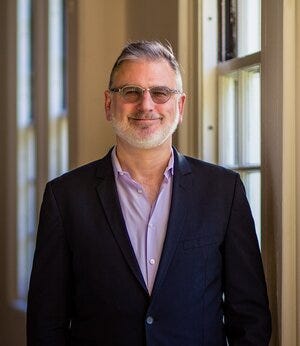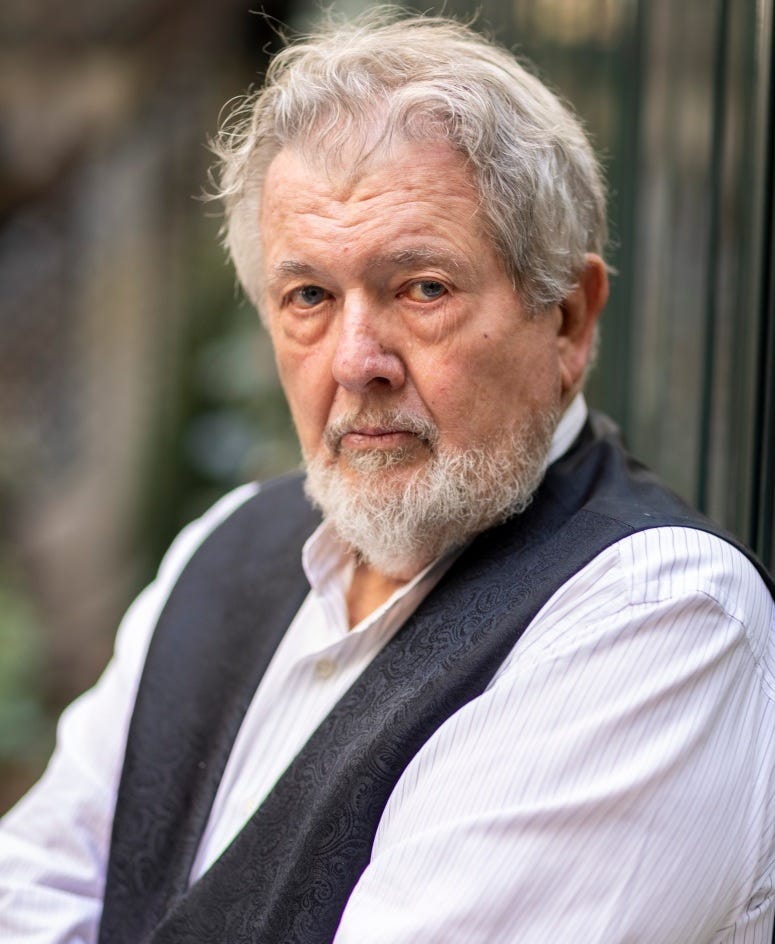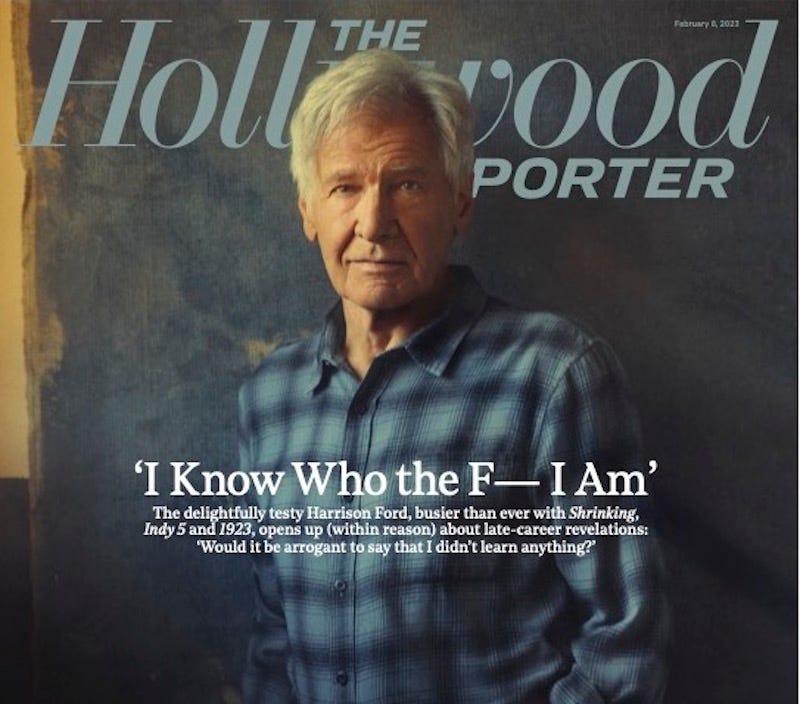Memory Piece: Noah Cowan, Walter Hill, Harrison Ford, Gordon Quinn, Chris Jones
The passing of eras.
Noah Cowan, 2018.
Noah Cowan. Things to recall from decades of acquaintance and always-great bursts of conversation, even when it’s suddenly on a sidewalk outside a Los Angeles hotel, both headed to the same long-lead screening—why there? why then?—on a so-sunny weekend afternoon and taking up a particular conversation as if there had been only hours instead of months between.
Barry Hertz in the Globe & Mail:
The highly influential programmer was a passionate and voracious consumer of cinema. Thanks to his championing of everything from international genre fare to Canadian movies to LGBTQ+ features, Mr. Cowan helped cement TIFF’s reputation as one of the premiere film festivals in the world. He was also essential to building TIFF’s flagship Bell Lightbox multiplex from the ground up, a monumental challenge that was unprecedented in scope, ambition and vision “How do you go from distributing these dinky little shorts that I made in the ‘90s to putting on a hard hat and taking a bucket elevator to head up the construction of a major building?” says filmmaker Guy Maddin, whom Mr. Cowan commissioned to create Hauntings I & II, an art installation that helped launch the Lightbox’s opening. “That represents a rotation of brain hemispheres that I would simply not be able to pull off.”
Maddin of Cowan’s final year: “Never in my experience has a person died a more beautiful and loving death. He really did it right. It was well-curated.”
There are dozens, if not hundreds, of intimate tributes on Facebook and elsewhere, including producer Mark Tusk:
In Cannes Noah said Velvet Goldmine was “an epic love poem to music,” which also describes his too-short life; an epic love poem to cinema, epicurean delights, lady soul belters, doggies and most of all, to enduring friendships.
He showed a remarkable grace facing a ghastly illness and the outpouring of help he got in return was extraordinary to witness. I like to think he’s having a kiki at the great Zanzibar in the sky with Wouter [Barendrecht] & all we lost before him…
hashtag fuck cancer
Guillermo del Toro, pungent:


Noah changed his Facebook cover picture at the end of December after a year of posting photos of world travel, meeting with friends and sharing magnificent meals. Boundless joie de vivre.
His online archive is here.
“Hello, I’m Noah Cowan. This website is a living repository for my writing. Much of this work occurred as part of my other activities—as a film festival programmer and director, as a curator of visual art and film-related exhibitions, as a film executive, and as a journalist covering international film festivals and other events. While some of these texts are available in other locations and in other forms, I felt it might be helpful to anyone studying the history of film and film festivals to have them together in one place… I have had a lucky life so far—I was among the first to see and write about many films that had their premieres at the Toronto International Film Festival and other festivals around the globe. Later on, I was proud to create unique exhibitions that required extensive long-form written consideration. Looking back, I see such a wonderful and powerful cultural universe that unfolded around me—I was happy to have had a few things to say about it all and to be able to share those thoughts.”
Walter Hill during Dead For A Dollar.
WALTER CHAW’S “A WALTER HILL FILMS” IS A TREASURY. I discovered Hill’s movies very young and got to see them on big screens in the big city. Taut, laconic, vital work, but few people have written about Hill at any length—Dave Kehr was early and astute in writing about The Driver in a piece that’s not online but is featured in his seminal compendium, “When Movies Mattered”—and Chaw’s big, bold book is a keen corrective to that cultural cataract.
Hill told Mark Olsen in the Los Angeles Times in 2022:
I’ve had a number of movies that a few years later turned out to be better thought of. The Driver is certainly the best example. Every festival I’ve been to shows The Driver, it’s one of my leading cards. The Driver was, in the United States, a complete critical and commercial failure. I did not get one good review. They were all bad except one: Dave Kehr, Chicago Reader, who got everything that I was trying to do. I will also say, when you’re a young filmmaker, you may deny it, but they all read the reviews. When you get older, you don’t. Somebody says, “Oh, you ought to read this one.” Sometimes you do. And that’s not a knock on the critics. They’ve chosen a rough way to make a living. And a good critic is an artist as well. God knows we need good criticism.
Walter Chaw's ebullient, epic career reconstruction and festschrift is good criticism, and so much more. Copies of the hardcover are available, with a forthcoming paperback edition from MZS Press here.
In the Hollywood Reporter’s cover story, the writer asks Harrison Ford about when he was young and read philosophy.
Yeah. There’s a Protestant theologian named Paul Tillich who wrote that if you have trouble with the word “God,” take whatever is central and most meaningful to your life and call that God. My mother was Jewish, my father was Catholic, and I was raised Democrat—my moral purpose was being a Democrat with the big D. But it didn’t apply to a political point of view so much as it applied to nature. I didn’t have any religious construct, but I think nature and God are the same thing. The mysterious origin of life—science tells us how it happened, prophecy tells us another story. I found that everything in nature—the complexity, the biodiversity, the symbiotic relationships—is the same thing other people attribute to God… Now aren’t you glad you asked that question? You want to get back to the funny shit? … I’ve been saving it just for you, man.
When K-19: The Widowmaker was released, I spoke to Ford. The conversation was filled with customary, if uneventful grumpiness. I wore an earring and he asked if it was sincere, or if I had aped him in anticipation. In all? The interview was useless.
A few hours later, we both arrived at a higher-floor foyer of the elevator bank in the old Chicago hotel where the interviews were taking place.
“You don’t sound like you’re from here,” Ford said. “Chicago, I mean.” I told him I was from Kentucky, but had lived in Chicago a long, long time. “What do you know about the history of the West Side?” he asked, stepping slightly closer. We talked for longer than the interview had gone, and exchanged a few stories of earlier times in each of our lives. The fourth or fifth time the elevator arrived, Ford said, “It’s good talking.” He nodded back to the interview room. “That’s only work.”
Gordon Quinn in the 1990s.
I’ve known Gordon Quinn a long time: he’s got lots of stories, and many are about the Chicago that’s past. He wrote a brief piece in Newcity’s thirtieth Best of Chicago issue.
For me, Chicago is the neighborhoods I lived in and the people I learned from and, of course, the restaurants. All were accessible, affordable, and had a certain honesty about them. I lived in Hyde Park (Valois, Salisbury steak), Lincoln Park (Peters Roasted Chicken, club sandwich), West Lincoln Park (the Colonial Confectionery, Blue Plate Special) and Logan Square (Le Cafe Station, Taco Tuesday), often moving west to escape gentrification, which would catch up with me anyway.
Facade, former Varsity Theater, downtown Evanston, Illinois. (The Gap and MattressFirm are also gone.)
Chris Jones, editorial page editor as well as chief theater critic for the Chicago Tribune and Broadway critic for the New York Daily News posted on Facebook about his experience with a fallen theater in Evanston, Illinois, now held by AMC in what may be its waning days (both the ailing multiplex and the wounded theater chain). A few hundred yards away was once a 2,500-seat movie palace called the Varsity Theater, where I saw movies while in school and later so briefly worked its concession stand.
Post-pandemic, AMC acquired the the Cinemark Century 12 and CineArts 6 and reopened twelve of its screens as the AMC Evanston 12.
So I'd been dying to see Living, the Oliver Hermanus movie about changing your life at the 11th hour that scored Bill Nighy an Oscar nomination, which he should win. It is an incredibly deep performance in the most beautiful and heart-breaking film…
I've been rebelling against watching movies at home and trying to get out again to the movie theater, where they should be seen. But Living was hard to find and I ended up in Evanston at the downtown Century movie complex where i went so often when we lived there, as we did for 11 years when our sons were young. We made a lot of memories at this place.
It was so depressing to see it today. Once a sweeping destination of glamor with live jazz and a bar and restaurant, it is now barely alive. AMC has taken it over, walled off half of it (the old art house half), ruined the lobby, covered up the art, [partitioned] off the concession stand and generally turned what used to be a wonderful moviegoing destination into a sad vista of decay; sitting there with all of three other people on a Saturday night, for goodness sake, was like being in an episode of "The Last of Us."
Even the marquee, and I love marquees, was dark.
It fit the mood of this melancholic film which was, for me, transformative. But such a sad thing to happen to Evanston, a place that always has celebrated film.
Streaming has come at a price: self-imposed isolation is to a large extent what this film, set in the 1950s, is all about. Just a different kind and 70 years earlier than what we face today.








